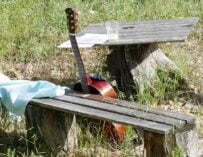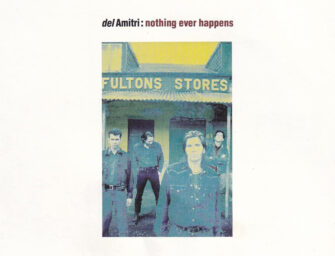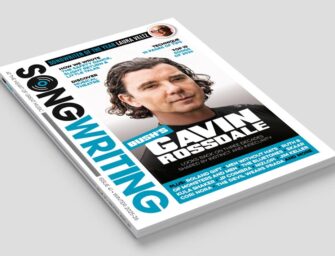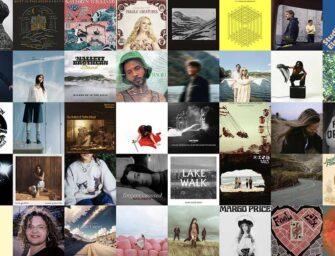
Sam Evian: “I find it to be a little more inspiring to be out in the woods.” Photo: CJ Harvey
For his new album, the New York songwriter and producer took the plunge and headed off to the Catskill Mountains
Versatile alt-rock musician Sam Evian recently unveiled his fourth album, Plunge, comprising nine thoughtfully curated tracks. Recorded at his personal recording studio, Flying Cloud Studios, nestled in the Catskills region, the album boasts vintage equipment dating back to the mid-1970s. Additionally, it’s the inaugural release on Evian’s independent label, Flying Crowds Recordings.
Lyrically, Evian wrote the album from the viewpoint of his parents while focusing on simplicity, finding beauty in everyday experiences and emotions. His lyrics explore themes of longing and introspection, juxtaposed with poetic narratives that capture the essence of life’s fleeting moments. Melody wise, Plunge is a refreshing blend of pop-infused tunes and jazz-inspired rhythms. Through his minimalist approach to arrangements, the songwriter/producer, who has worked with the likes of Johanna Samuels and Hannah Cohen, showcases his skilful manipulation of tones, drawing from a diverse range of influences to craft a sound that is both timeless and modern.
The day after a sold-out performance in London, Evian took some time to chat with Songwriting Magazine in Hackney. He delved into topics ranging from his creative process to the influence of cold plunging on his music, as well as how watching the documentary The Beatles: Get Back reinforced his confidence in his collaborative practice…
Get to know more songwriting New Yorkers
Did you title this album based on you and your collaborators doing a cold plunge together?
“I actually named it Plunge for two reasons. First, I like the word a lot and there’s a Martin Heidegger book that I was reading and it started with a poem. There’s a snippet; ‘rivers plunge, streams plunge,’ or something like that. The whole intro of the book is a very long phone that kind of interjects wisdom in between the stances. It paints this picture of where I live, like a cabin in the mountains. It felt really fresh. So I was attracted to the word “plunge” after being engrossed in that work.
“Then, I got into cold-plunging because I was trying to curb my alcohol intake. I was looking for nifty ways to change habits. It’s so good for your chemistry, your body, and your nervous system. People use it to treat anxiety and depression. It helps your immune system. Then, of course, when I had my bandmates, I forced them into it as well.”
Do you notice any change in your songwriting process based on cold-plunging?
“I felt like I had a clear vision into the subject matter. I felt like it just unlocked… Honestly, it just helped me through the winter blues. It’s a very fresh feeling to get out. You feel activated and your brain is moving and then you go write music.”
Is that still part of your process?
“It is. I’ve been doing it pretty consistently for over a year.”
And you did that before you wrote the songs on the record?
“I had started cold-plunging and I wrote all the songs for the record. It took me a while to zone in on the lyrics, the forms and the arrangements that I had in mind. Once I did that, I brought the band in and basically didn’t really teach them the music until the moment we recorded it.
“So it has this spontaneity and freshness to it that feels like a punch to me. They’re learning and their fight or flight response activates. It’s a cool way to work on music. That’s what I love about music; these moments of improvisation when you’re working on arrangements. And it’s what I love about recording.”
Having previously worked on more polished recordings, how did you embrace the spontaneity?
“I’m a producer. I run the studio and, whether it’s polished or not, it’s my job to facilitate other people and let them be the chaos. I’m what guides the chaos. For my own projects, I let go of the facilitator and I become the chaos. I’m so fluid with my workspace that I can do that now. I can let things open up and not get trapped in technical details. I’ve reached a point in my career, in my workflow, that it feels really good to do that. So for me, it’s about embracing that part of myself.”

Sam Evian: “Don’t be afraid to make something bad. Don’t be afraid to make mistakes.” Photo: CJ Harvey
One of the interesting things about the album is that you wrote it from your parents’ perspective, how did you channel that?
“Deep investigation of memory; where we’re all at now, and where we’ve been. When you look at where you’re from and who made you, you’re ultimately just looking at yourself. It’s a lens to see myself through to write honestly. It was the moment I needed to do that. My parents are really important to me. They’re musicians.”
And did you learn songwriting from them?
“They’re jazz musicians so I learned standards. It was a really formative way to learn about music.”
Assuming they’ve heard the album, do they feel like you’ve captured their voices?
“It’s all interpretive. I don’t want to throw them under the bus or anything. I hope that they don’t feel like I’m zeroing in on them, in the crosshairs. My mum told me she feels very heartened by it and she feels seen.”
You’ve described this as more heavy lyrically than your previous work. Did you go into this project with that in mind, or was that something that happened through the process?
“I’m a student of songwriting. My goal is to improve my writing over the course of my career. I would hope that my writing is more direct and honest than it ever was. It’s a constant goal of improving and being more real and honest with myself.”
When you say you are a student of songwriting, who inspires you?
“Bob [Dylan] and Neil [Young] are my lyric guys – and Joni [Mitchell]. When I say it’s inspired by The Beatles, it’s more the workload. So, I watched Get Back like everyone else in the world and was obsessed with seeing them work in the studio once Billy Preston got there. The second half reaffirmed a lot of ideas for me about how I like to structure a recording session, which is to have this fluid environment where anyone can do anything. You’re not fussing over isolating things and everything’s happening live. You’re writing in the moment and coming up with arrangements on the spot. That’s just so well exhibited and it truly reaffirmed everything for me. So when I say I was inspired by The Beatles, it’s more like the workflow that I was inspired by.”
How did you adapt your writing to complement the vintage element of the studio environment?
“I think they’re tied together. The workflow that I have adapted is not necessarily vintage, even though it’s often called “sepia toned”. I think it’s a good way to work on music. It’s a classic way to work on music; get people together in a room, work on an arrangement together, fill it up, practice it, put it down on tape, don’t overthink. I think that’s a great quality for any recording, modern or not. It’s just a great way to practice recording.
“As far as tape goes, it’s a wonderful format. It’s like writing by pen in your notebook versus using your iPad. Obviously, the iPhone has a place and so does digital recording. But, I think the format creates a wonderful environment to work in. It sets some limitations that I think are really important.”
Was there any part of the documentary that influenced your songwriting?
“It’s fun to see Paul’s method of pulling words out of the air and mumbling things until they’re words. I do that sometimes. When you’re writing a melody, it’s helpful to have sounds. But, I was trying to be more direct and a little more introspective with the lyrics, so I thought long and hard about them.”
Did you feel like your process evolved throughout your writing?
“Yeah, definitely. Once you start consistently doing it every day it starts coming out easier. Your practice comes together. I don’t write every day, although I should, but sometimes I have to get the gears turning again and get in the right mindset. The plunging was really effective for that as well.”

Sam Evian: “For my own projects, I let go of the facilitator and I become the chaos.” Photo: CJ Harvey
This is the first release on your own imprint. Did you feel like that allowed you to explore themes or styles that you might not have pursued otherwise?
“Definitely. I had no expectations. I started the session on January 2nd and the goal was to start the year out with my creative foot forward to see what happens. I didn’t have a label that was signed up to distribute it or an agreement with a distributor like I do now. It was a very open situation, and anything could happen. What happened was the result of the people I brought together.”
Did your collaborators mention anything about the changing environment impacting their creative process?
“It’s pretty unavoidable. It was winter so it was cold outside and cosy inside. It’s the Catskill Mountains. It’s a gorgeous place. It’s fun to see them arrive and see the city wash off of them. They shed this layer of anxiety and they settle into the studio situation, which is quite communal. Everyone has a room and we cook meals together and live together. It’s like being roommates.”
Are you writing while on tour?
“I tried to, but I feel like it’s a different brain and it is actually less creative. I’m not in my creative space, but I’m kind of just surviving. It can be really inspiring to play an amazing show and feel good about it and go to the hotel room and kick out some verses. I try to write poetry when I’m on tour. I don’t necessarily write songs, but I’m always putting words down.”
So is poetry part of your songwriting practice as well?
“Yeah, studying language is important. I try to write when I can, and just keep my muscles activated. Songwriting is a muscle and it’s, ‘use it or lose it.’ So, I try to stay consistent so that I’m present when a real idea does strike.”
How does your studio environment influence your creative practice?
“I lived in Brooklyn for 10 years. It’s hard to find space to really let yourself loose and make noise. So I was always dreaming of that space when I was there. Moving up to the Catskills and finding this place that I live now is the most important thing for me. It made such an incredible difference in my ability to create when the moment strikes.”
Did you find that you’re able to keep your songwriting partnerships after the move?
“Luckily, it’s only two hours from New York City so I’m pretty connected with my community there. But, I find it to be a little more inspiring to be out in the woods. To be out in the country, seeing normal people doing their thing is inspiring to me. I’m a night owl. So I can go out at two in the morning and play loudly and explore ideas and listen to my music.”
Is this your first time working in this type of environment?
“I did rent a house up in Woodstock to make a record in 2017. That’s actually how I decided I wanted to live outside of Woodstock. Just the experience was so good and enriching. I drew a circle on the map after that and was like, ‘It has to be here.’”
Do you have a favourite lyric on the album?
“Rollin’ In. I’m really proud of it and it’s really visceral. I think the verses are very much through my mum’s eyes. I’m proud of the way that one turned out. I like to write in circles. I like a song that feels circular and feels like it’s constantly driving and riding along and in a pattern. It also has this ascension feeling to the chords where they’re constantly rising.”
Do you have a dream songwriting collaboration?
“Cate Le Bon and Brian Eno.
Lastly, what advice would you give to other songwriters?
“Don’t be afraid to make something bad. Don’t be afraid to make mistakes. Accept what you make and continue to treat it as an exercise and practice. Do it as much as you possibly can.”

































Related Articles